Playing piano has been shown to boost a range of cognitive skills – so yes, you could say that it makes you smarter. Playing music in general, and piano in particular, is a brain workout that contributes to increased enhanced creativity, planning, and organizational skills. It also strengthens the parts of the brain responsible for mathematical and logical thinking, and reduces stress and anxiety.
Are you thinking about taking piano lessons and wondering about the benefits of playing music? If so, you may have heard that musical training can make you smarter. Instrumental music instruction is an important part of many school curricula, because music education and musical training has the potential to make people smarter.
So does playing piano make you smarter? Read on to learn more about how becoming a piano student may help you benefit your overall intelligence.
Post Contents
What Are the Benefits of Playing Piano?
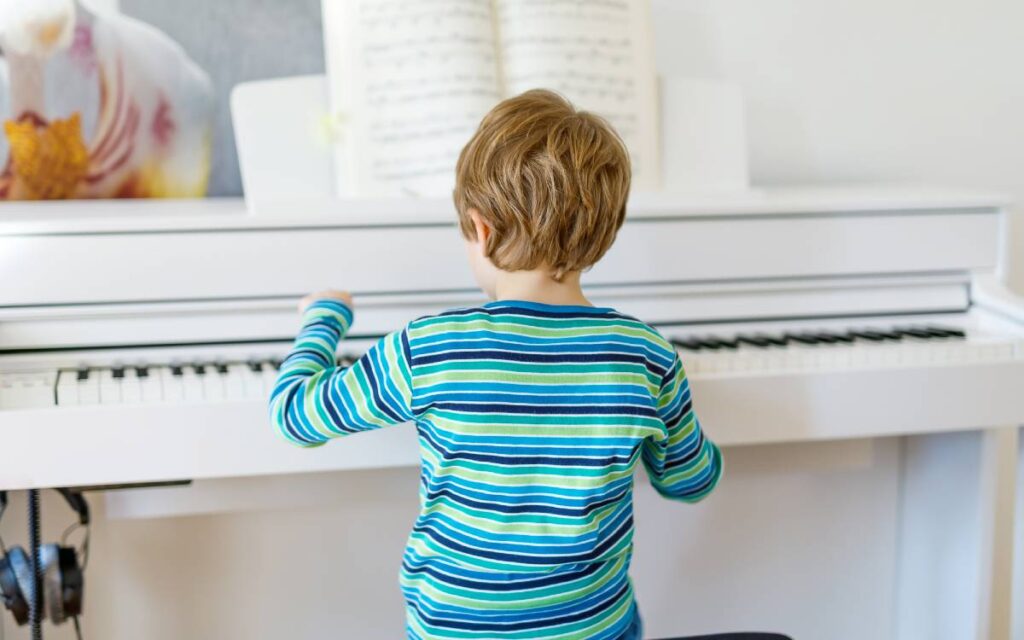
Learning how to play piano comes with a wide variety of benefits. Music training on the piano can help you improve your language skills, motor skills, and listening skills. Furthermore, a piano player has an enhanced ability to multitask.
Picking up the piano can also help you improve your social life by getting you more involved in the community. You can connect with other people who play similar instruments, and explore different opportunities related to music.
But, can learning to play piano actually make you smarter? Playing piano will work parts of the human brain that are otherwise not exercised extensively, such as the parts vital for spatial intelligence, math, science, and numerous other cognitive functions.
Piano players will learn to use both hands at the same time. When you are playing scales, arpeggios, and different chords, you improve your hand-eye coordination. This can benefit you when you play sports like golf, baseball, and tennis.
Learning piano is beneficial because it benefits both sides of the brain, which are each responsible for different tasks. The left side of the brain is the territory of reasoning and Logic, while the right side of the brain is the domain of creativity. Music training on the piano requires both parts of your brain to work simultaneously. Therefore, your brain will get stronger and more coordinated if you practice the piano regularly.
Exercising both brain regions is important for cognitive development that can improve your memory, attention span, and concentration. Learning piano can also help you improve your hearing, which will translate to other areas of the classroom.
Now, let’s take a look at some specific examples of how playing the piano make you smarter.
Learning Piano Helps You Multitask
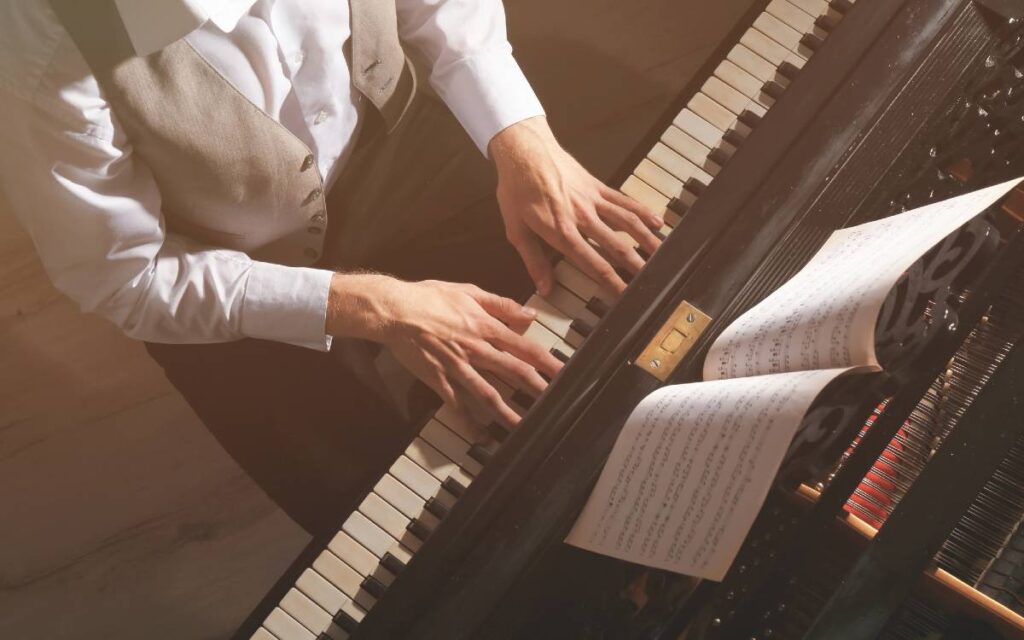
One of the first benefits of learning how to play piano is that it will help you learn to multitask. Your brain will have to work in overdrive to learn how to play the piano at a high level. When learning music, your brain has to perform a lot of individual tasks at the same time. You have to follow pitch, form cords, maintain appropriate posture, and control your breathing.
Of course, you also need to coordinate your right and left hands as they dance across 88 keys to make a song. As you get better at the piano, you also have to interpret sheet music, operate the pedals, and turn the pages on time.
Clearly, this kind of musical training is a monster workout for your brain. You need to take advantage of auditory, visual, creative, and logical skills to put your motor functions to work.
Therefore, as a piano player you will have to learn how to multitask, which will serve you well in other areas, particularly the classroom. You may find it easier to keep up with your homework, pay attention to the teacher, and take notes if you play the piano regularly, which would lead to increased academic achievement.
Music Lessons Can Build Brain Power
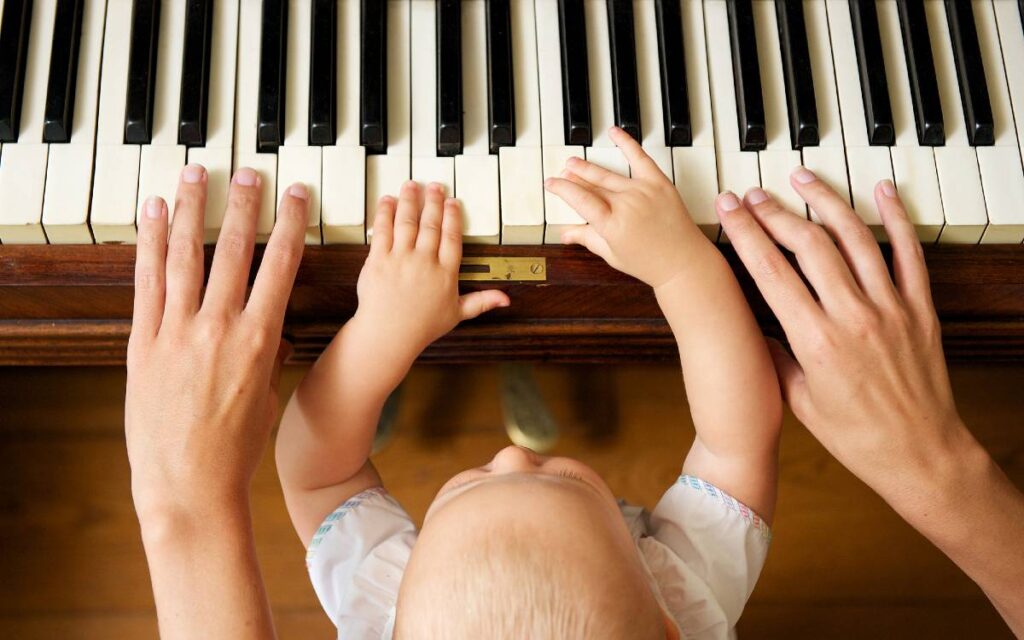
Learning how to play piano can also build brainpower. Regular practice can help you improve the bridge between the right and left sides of the brain. This makes it easier for your frontal lobe to operate efficiently.
As a result, people who play an instrument regularly may have significant advantages when it comes to social behavior, spontaneity, language, and problem-solving. Even though this is still a relatively new area of research, it also means that more benefits could be discovered down the road.
For example, one scientist, named Gottfried Schlaug, saw that children who took up musical instruments in early childhood actually experienced an increase in brain capacity vs a control group. Two-handed instruments, such as the piano, provided the most benefit.
As a result, if you are asked to play the piano regularly, you may experience an increase in brainpower. This could be further evidence that playing the piano could actually make you smarter.
Piano Lessons Can Encourage Your Creativity

It should come as no surprise that taking piano music classes regularly can help improve your creative skills. Specifically, this is called divergent thinking.
Divergent thinking means that musicians have the ability to come up with new solutions to challenging problems. Instead of approaching everything the same way, musicians have a tendency to think outside the box. Even though this is certainly beneficial when you are trying to interpret a new piece of music, the benefits can extend to other areas as well.
For example, this means that musicians may be able to come up with solutions to problems that other people cannot. When you read music, you interpret factual information, such as the time signature and the key. At the same time, you also have to think outside the box to interpret the music differently.
This is particularly beneficial if you are being asked to improvise. If you play the piano regularly, you will learn how to think outside the box as part of your creative expression, coming up with solutions to problems that other people might overlook.
Musical Training Can Be Beneficial for Your Memory
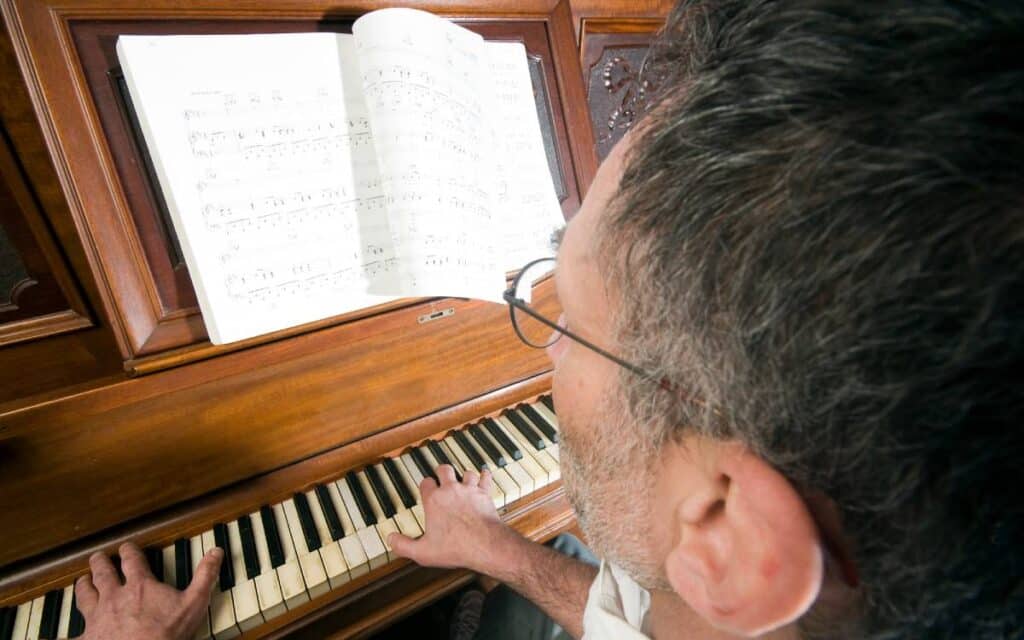
It is not exactly a secret that you need to protect your memory if you want to do well in the classroom. Musical training at a young age can help you develop self-esteem, discipline, and academic skills. At the same time, learning how to play the piano when you get older can reduce depression, anxiety, protect your memory, and stave off cognitive decline.
In this manner, a piano habit in adulthood may help you prevent the onset severe neurological issues, including dementia. Piano music training can also improve your cognition and dexterity, providing a healthy outlet for stress relief.
Research findings from a study at Northwestern University indicated that elderly people who played piano experienced improved memory and mental clarity. This means that it might be possible for you to keep your mind sharp as you get older if you play the piano regularly.
Even though there are a lot of people who learn how to play the piano as children, it is never too late to learn a new skill. If you decide to pick up the piano when you get older, you may be able to maintain your cognitive abilities and prevent the development of serious memory issues.
Playing the Piano Develops a Strong Social Network
If you want to get smarter, investing in a strong social network is key. And playing piano works to do exactly that because it can help you get out there and meet other musicians. You may be able to join a band as a keyboard player, or accompany an entire orchestra. If you do these things, think of all the people you’ll meet!
The social side of life is critical. Music can open the door to meeting new people that you may not otherwise encounter. Exposing yourself to new people can have a profound impact on keeping your brain in tip top shape, lower blood pressure, and encourage other aspects of well being.
Some ways that a piano may encourage you develop a strong social network include:
- You can play music with others, allowing you to join a band or simply mess around with your friends.
- You can play for other people. Sharing your talent with others is one of the most fulfilling parts of learning to play the piano.
- You can meet a lot of very smart music teachers by taking lessons. Even though some people prefer to learn online, there is nothing like getting a personalized lesson.
- You can also teach others to play piano. This is another way to give back and meet new people.
These are just a few of the top ways learning to play piano can have a positive effect on your social life, which in turn can make you smarter.
Learning to Play Piano Teaches Persistence
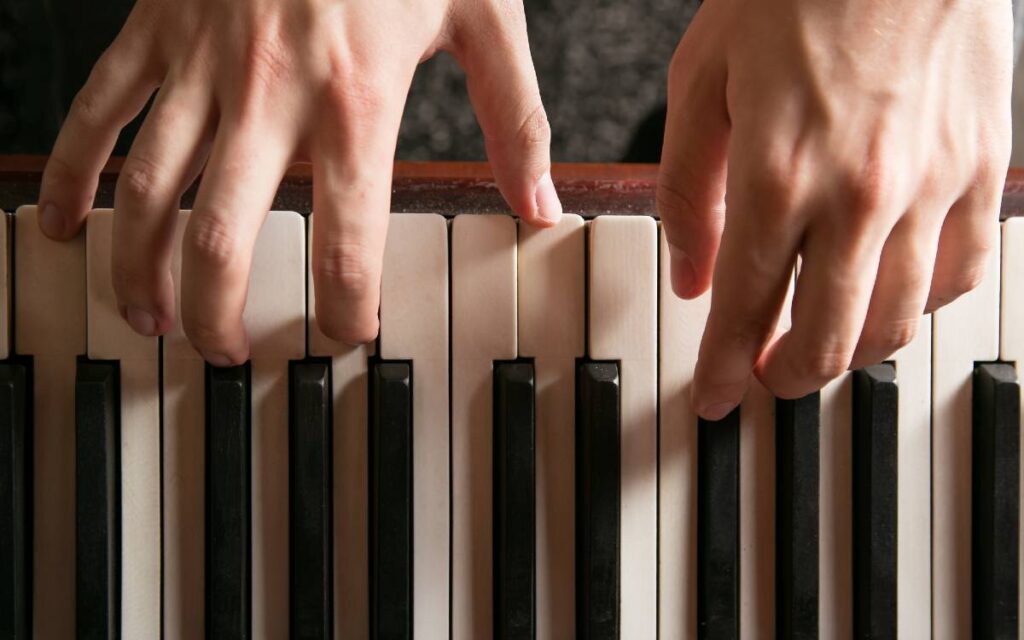
If you want to get smarter, you have to be persistent. You are not going to achieve all your goals the first time around, regardless of whether you are sitting in the classroom or in front of the piano.
Learning to play piano takes time, and isn’t easy. It teaches you how to set goals for yourself. Every song you learn probably going to be more difficult than the last. Your brain, feet, and fingers will do things that they have never done before.
Even though it can be frustrating if you do not hit all the notes correctly, practice makes perfect. It’s incredibly fulfilling to nail a song after a ton of grueling practice.
This type of persistence translates beautifully to academics as well. You may have a difficult time understanding that challenging equation in math class. You may not fully grasp a chemistry formula you see on the board in front of you. But, if you are persistent, you will learn from those lessons as well.
Persistence is an important aspect of classroom success, and learning to play piano can help you develop this skill.
Playing the Piano Helps with Language Skills
One of the biggest benefits of learning how to play the piano is that it can help you with your language skills. Music is a beautiful language because it does not require any translation. The notes are always written the same regardless of the language you speak.
At the same time, the language of music can also improve your general language arts skills, and even help you learn foreign languages. Studies have shown that musicians are better than non-musicians when it comes to incorporating sound patterns into words. A musician’s appears to comprehend speech and other audio information better against a noisy background.
If you want to improve your ability to grasp new languages, then you may want to consider learning how to play piano. It may do wonders for your language skills.
Playing the Piano Develops Motor Skills
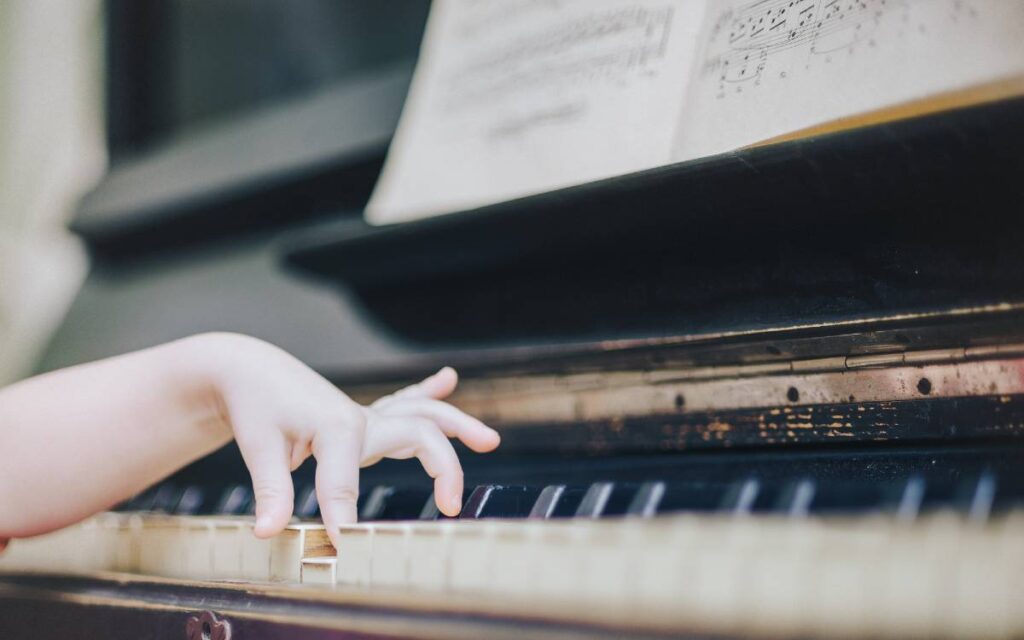
Even though this might not necessarily be an example of how playing the piano makes you smarter, it is still important for the overall development of a child. Playing the piano is suitable for people of all ages, including young children.
If children learn how to play the piano during those formative years, they can master early motor skills. This could make it easier for children to learn how to grasp a pen or pencil, play sports, do chores around the house, or learn other skills.
Of course, playing the piano also gives children a good sense of rhythm. This is another important part of motor and coordination development. The earlier children start learning how to play the piano, the bigger these benefits are going to be.
Playing the Piano Can Increase Your Test Scores

Finally, there are some people who might be looking for objective evidence that playing the piano makes you smarter. The reality is that students who participate in music lessons tend to score higher on standardized tests than those who do not.
There are numerous studies that have been conducted across the country, and most of them have produced similar results. There are many reasons why students who learn how to play the piano might do better on standardized tests. Some of the biggest include:
- Learning how to play a musical instrument, such as the piano, may change the way signals flow through the brain, making it easier for students to interpret information quickly.
- Students who are taught how to play instruments from a young age often have better time management skills because they are busier than other children.
- Playing a musical instrument encourages children to continue trying, even if they do not have the right answer on the first attempt. This may make it easier for students to solve challenging questions.
Ultimately, these are just a few of the many reasons why students who take music lessons may end up doing better on standardized tests. Every child is different, but every child also has the ability to learn how to play an instrument, and there are clear benefits that may make children smarter.
What Are the Other Benefits of Playing the Piano?
As we’ve seen, there are a lot of benefits that come with playing the piano. At the same time, there are many people who are curious about other potential benefits as well. These include:
Organization
Students who learn how to play the piano are often better organized than those who do not. It can be a challenge for students to juggle multiple activities at the same time. Students who play the piano can dramatically improve their organizational skills.
Hand Muscles
Playing the piano is also great for strengthening the hand and the fingers. Students who play the piano regularly can improve their dexterity. This can translate into other important life skills including typing, sports, and writing.
Muscle Memory
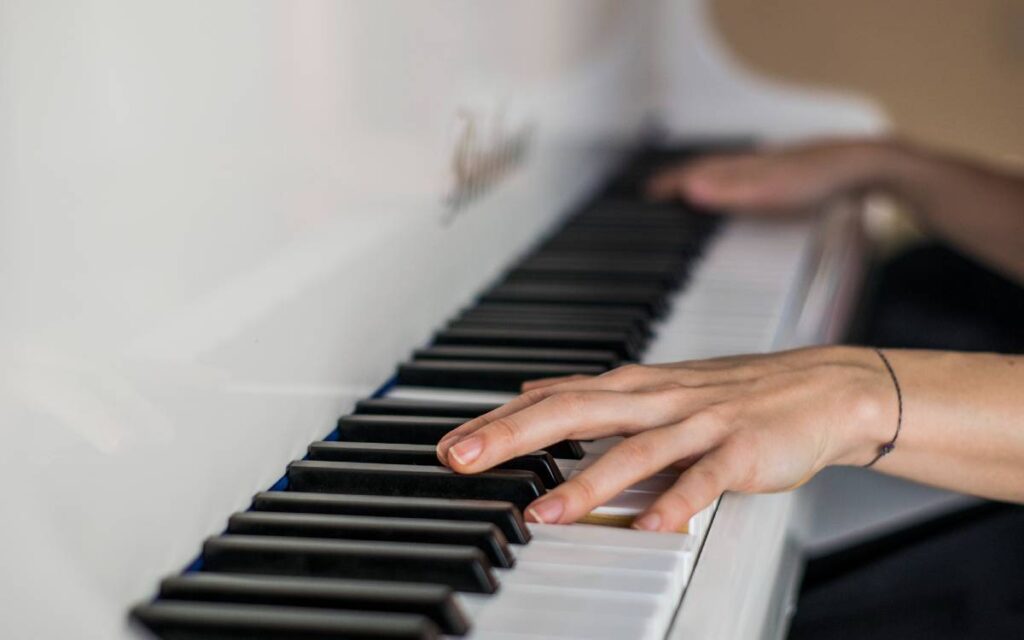
Students who play the piano regularly will develop strong muscle memory. A lot of piano students are asked to memorize the pieces they are learning. This type of muscle memory can translate positively into other areas of life, particularly when students are trying to learn a new language, master a math equation, or study science.
Self-Esteem
Individuals who play the piano regularly often have higher levels of self-confidence. It takes a lot of confidence to sit in front of people and play a piano piece. When students realize they have this type of capability inside of them, it can do wonders for their overall self-esteem.
Cultural Knowledge
Learning how to play the piano is a great way to learn about another culture. When students have the ability to play multiple types of music from across the world, they can expand their knowledge of other cultures.
Stress Relief
Playing the piano is also a great source of stress relief. Many people play because it is totally different from everything else they do during the course of the day. If you are looking for a healthy outlet to release your stress, consider learning how to play the piano. It can do wonders for your mental health.
Does Playing the Piano Make You Smarter: FAQs
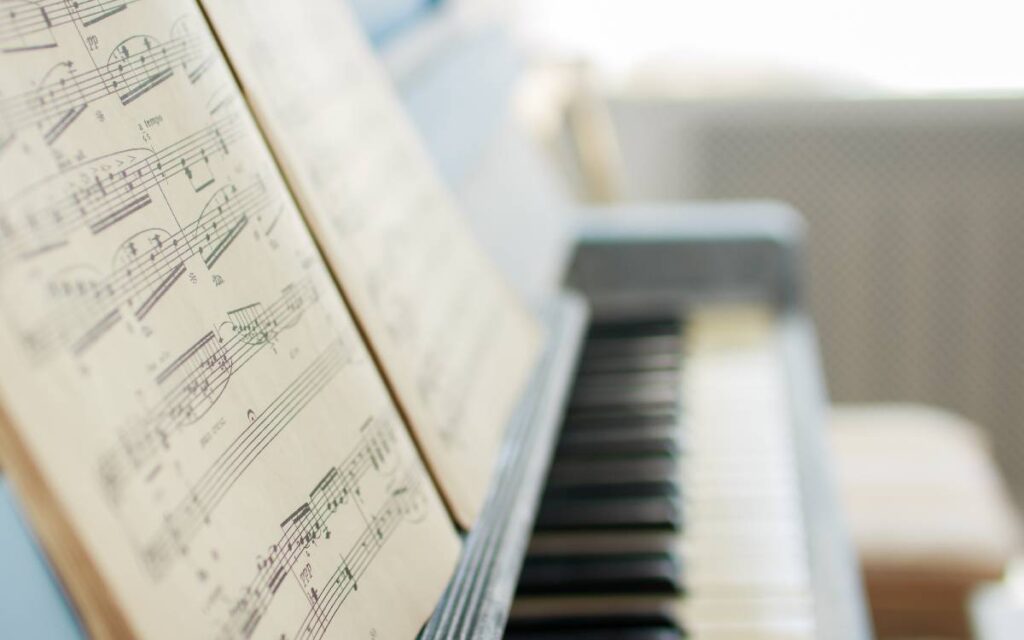
Clearly, learning how to play the piano can make you smarter. However, you may have a lot of questions about this process.
Do I need to be able to read sheet music to play the piano?
No, not necessarily. But you should learn how to read sheet music if you want to get the most out of the experience. This is where piano lessons can be helpful. You can learn how to play the piano by ear, but reading music will help you advance further.
How often do I need to practice the piano if I want to play well?
Everyone is slightly different, but you should try to play the piano every day if you really want to make improvements. This is particularly true for children who want to play some of the most challenging pieces in all of classical piano.
Does playing the piano help you improve your memory?
Yes, learning how to play the piano can dramatically improve your memory. You need to learn a lot of notes if you want to master piano pieces. This is going to challenge your working memory, which will serve you well in other areas of life.
Do I have to take piano lessons to learn how to play the piano?
Although you can learn piano by ear or via Youtube videos, if you want to learn how to play the piano properly you should consider signing up for piano lessons. That way, you can learn proper techniques for playing the piano from an experienced piano teacher.
Are there any downsides top playing piano?
Playing the piano comes with a range of benefits and is a whole lot of fun. But there are some real downsides to playing piano too, from high cost to finicky maintenance, and more.







